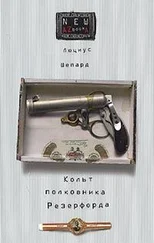“Yeah,” I said. “I know.”
“Fucker’s paranoid,” said Skipper. “Be paranoid myself if I was holding a key of smack.”
“Heroin?”
“King H,” said Skipper with immense satisfaction, as if pronouncing the name of his favorite restaurant, remembering past culinary treats. “He’s gonna run it up to Copenhagen soon as—”
“Shut the hell up!” It was Shockley, standing in the front door. “Get out,” he said to me.
“Be a pleasure.” I strolled over to him. “The twins are leaving tomorrow night. Stay off their case.”
He squared his shoulders, trying to be taller. “Or what?”
“Gee, Rich,” I said. “I’d hate to see anything get in the way of your mission to Denmark.”
Though in most areas of experience I was a neophyte compared to Shockley, he was just a beginner compared to me as regarded fighting. I could tell a punch was coming from the slight widening of his eyes, the tensing of his shoulders. It was a silly school-girlish punch. I stepped inside it, forced him against the wall, and jammed my forearm under his chin. “Listen, Rich,” I said mildly. “Nobody wants trouble with the Guardia, right?” My hold prevented him from speaking, but he nodded. Spit bubbled between his teeth. “Then there’s no problem. You leave the twins alone, and I’ll forget about the dope. Okay?” Again he nodded. I let him go, and he slumped to the floor, holding his throat. “See how easy things go when you just sit down and talk about them?” I said, and grinned. He glared at me. I gave him a cheerful wink and walked off along the beach.
* * *
I see now that I credited Shockley with too much wisdom; I assumed that he was an expert smuggler and would maintain a professional calm. I underestimated his paranoia and gave no thought to his reasons for dealing with a substance as volatile as heroin: they must have involved a measure of desperation, because he was not a man prone to taking whimsical risks. But I wasn’t thinking about the consequences of my actions. After what I had seen earlier beyond the point, I believed that I had figured out what Tom and Alise were up to. It seemed implausible, yet equally inescapable. And if I was right, this was my chance to witness something extraordinary. I wanted nothing to interfere.
Gray clouds blew in the next morning from the east, and a steady downpour hung a silver beaded curtain from the eaves of my porch. I spent the day pretending to write and watching Alise out of the corner of my eye. She went about her routines, washing the dishes, straightening up, sketching—the sketching was done with a bit more intensity than usual. Finally, late that afternoon, having concluded that she was not going to tell me she was leaving, I sat down beside her at the table and initiated a conversation. “You ever read science fiction?” I asked.
“No,” she said, and continued sketching.
“Interesting staff. Lots of weird ideas. Time travel, aliens…” I jiggled the table, causing her to look up, and fixed her with a stare. “Alternate worlds.”
She tensed but said nothing.
“I’ve read your notebooks,” I told her.
“Tom thought you might have.” She closed the sketchpad.
“And I saw you trying to open the tunnel yesterday. I know that you’re leaving.”
She fingered the edge of the pad. I couldn’t tell if she was nervous or merely thinking.
I kept after her. “What I can’t figure out is why you’re leaving. No matter who’s chasing you, this world can’t be as bad as the one described in the notebooks. At least we don’t have anything like The Disciples.”
“You’ve got it wrong,” she said after a silence. “The Disciples are of my world.”
I had more or less deduced what she was admitting to, but I hadn’t really been prepared to accept that it was true, and for a moment I retrenched, believing again that she was crazy, that she had tricked me into swallowing her craziness as fact. She must have seen this in my face or read my thoughts, because she said then, “It’s the truth.”
“I don’t understand,” I said. “Why are you going back?”
“We’re not; we’re going to collapse the tunnel, and to do that we have to activate it. It took all of us to manage it before; Tom and I wouldn’t have been able to see the configurations clearly enough if it hadn’t been for your drugs. We owe you a great deal.” A worry line creased her brow. “You mustn’t spy on us tonight. It could be dangerous.”
“Because someone might be waiting,” I said. “The Disciples?”
She nodded. “We think one followed us into the tunnel and was trapped. It apparently can’t control the fields involved in the tunnel, but if it’s nearby when we activate the opening…” She shrugged.
“What’ll you do if it is?”
“Lead it away from the beach,” she said.
She seemed assured in this, and I let the topic drop. “What are they, anyway?” I asked.
“Hitler once gave a speech in which he told us they were magical reproductions of his soul. Who knows? They’re horrid enough for that to be true.”
“If you collapse the tunnel, then you’ll be safe from pursuit. Right?”
“Yes.”
“Then why leave Pedregalejo?”
“We don’t fit in,” she said, and let the words hang in the air a few seconds. “Look at me. Can you believe that in my world I’m considered beautiful?”
An awkward silence ensued. Then she smiled. I’d never seen her smile before. I can’t say it made her beautiful—her skin looked dead-pale in the dreary light, her features asexual—but in the smile I could detect the passive confidence with which beauty encounters the world. It was the first time I had perceived her as a person and not as a hobby, a project.
“But that’s not the point,” she went on. “There’s somewhere we want to go.”
“Where?”
She reached into her airline bag, which was beside the chair, and pulled out a dog-eared copy of The Tibetan Book of the Dead. “To find the people who understand this.”
I scoffed. “You believe that crap?”
“What would you know?” she snapped. “It’s chaos inside the tunnel. It’s…” She waved her hand in disgust, as if it weren’t worth explaining anything to such an idiot.
“Tell me about it,” I said. Her anger had eroded some of my skepticism.
“If you’ve read the notebooks, you’ve seen my best attempt at telling about it. Ordinary referents don’t often apply inside the tunnel. But it appears to pass by places described in this book. You catch glimpses of lights, and you’re drawn to them. You seem to have an innate understanding that the lights are the entrances to worlds, and you sense that they’re fearsome. But you’re afraid that if you don’t stop at one of them, you’ll be killed. The others let themselves be drawn. Tom and I kept going. This light, this world, felt less fearsome than the rest.” She gave a doleful laugh. “Now I’m not so sure.”
“In one of the notebooks,” I said, “Tom wrote that the others didn’t survive.”
“He doesn’t really know,” she said. “Perhaps he wrote that to make himself feel better about having wound up here. That would be like him.”
We continued talking until dark. It was the longest time I had spent in her company without making love, and yet—because of this abstinence—we were more lovers then than we had ever been before. I listened to her not with an eye toward collecting data, but with genuine interest, and though everything she told me about her world smacked of insanity, I believed her. There were, she said, rivers that sprang from enormous crystals, birds with teeth, bats as large as eagles, cave cities, wizards, winged men who inhabited the thin Andean air. It was a place of evil grandeur, and at its heart, its ruler, was the dead Hitler, his body uncorrupting, his death a matter of conjecture, his terrible rule maintained by a myriad of servants in hopes of his rebirth.
Читать дальше






